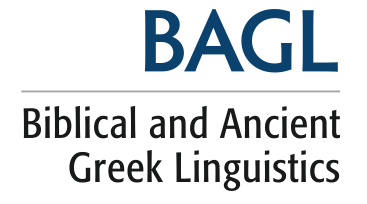3.1 | Paul L. Danove Villanova University, Villanova, PA, USA Τίθημι and its compounds present the broadest range of licensing
properties of any set of verbal compounds in the Septuagint and New Testament. This
article resolves the occurrences of τίθημι and its twenty compounds into
twenty–six distinct usages. The discussion of each usage “derives” the event that
the verbs grammaticalize, specifies the conceptualization of the event associated
with each usage, describes the syntactic and semantic requirements for verbs with
the usage, identifies the observed lexical realizations of required complements, and
illustrates occurrences of the verbs with the usage. The discussion then summarizes
the relationships among the usages, proposes a further basis for relating the
events, and notes the possibility of polysemous interpretations of verbal
occurrences. Keywords: event, lexical, semantic, syntactic, usage, verb |
3.2 | James D. Dvorak and Ryder Dale Walton Oklahoma Christian University Too often, study of the biblical text degenerates into rudimentary word
studies, leaving aside larger syntactic and logical connections. This paper proposes
that careful study should include considerations of genre, register, prime,
subsequent, theme, rheme, topic, and comment. To demonstrate this, it applies a
Systemic Functional approach to Mark 2:1–12 and the book of Jude. Keywords: Exegesis, Systemic Functional Linguistics, Prime, Subsequent, Theme, Rheme,
Topic, Comment, Process Chains, Semantic Shift, Cohesion, Coherence, Linearity,
Genre, Register |
3.3 | S. M. Kraeger Southeastern Baptist Theological Seminary, Wake Forest, NC,
USA Ever since the advent of the printing press, the Latin West and its
lexicographic inheritors have used the first person singular indicative verb form
(e.g., λύω) as the lemma of the Greek verb. There are historical reasons for this.
These historical reasons for using the indicative form, however, are not coextensive
with those by which modern lexicographers operate. This issue significantly overlaps
with pedagogical concerns. The present article seeks to sketch a basic history of
Greek verbal treatments toward a reevaluation of lexicographic and pedagogic
practice regarding the ancient Greek verb. Keywords: Lexicography, Pedagogy, Verb, Lemmatization |
3.4 | Stanley E. Porter McMaster Divinity College, Hamilton, Ontario, Canada This paper emphasizes the importance of both methodological and pedagogical
dimensions of elementary Greek grammars, and then briefly surveys several different
approaches found in current gram- mars. The paper takes what is called the
usage-based approach, in which grammar is introduced roughly according to frequency
of use so that students are reinforced in learning the grammar that appears most
frequently in the Greek New Testament. Porter, Reed, and O’Donnell’s Fundamentals
of New Testament Greek is used as the example of such an approach. Keywords: Greek, grammar, elementary, usage-based approach, morphological approach,
descriptivism, progressivism, immersion |

